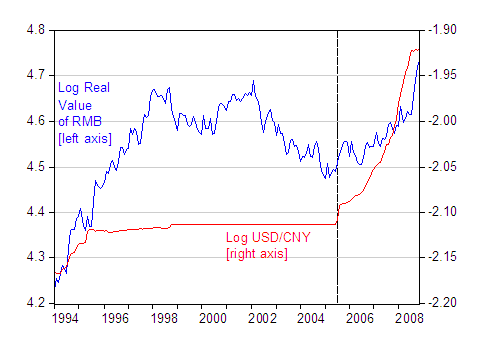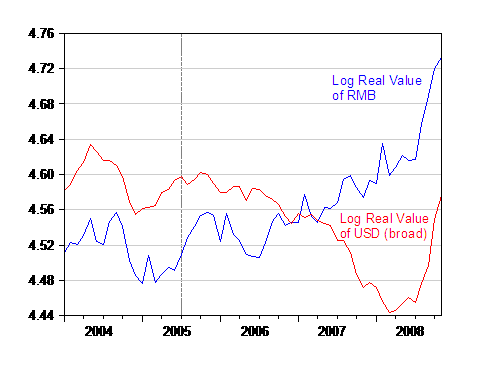Plenty of breathless commentary on how Chinese yuan depreciation against the dollar might trigger conflict. From Barrons:
Reality Check for China
By LESLIE P. NORTON
The currency’s decline could dampen foreign speculators’ enthusiasm
Last week, China’s currency, the renminbi, juddered to its biggest one-day decline against the greenback since Beijing began a managed float in 2005.
Says Win Thin, a currency economist at Brown Brothers Harriman: “The prospect of appreciation is off the table for now.” Morgan Stanley now expects China to depreciate its currency by 5% to 10% in the coming year. The current rate is 6.88 to the dollar.
The renminbi can float in a trading band of 0.5% on either side of the U.S. dollar and has gone up 20% against the buck in the past three years. To trim China’s fat trade surplus with the U.S., Treasury Secretary Henry Paulson is pushing for further appreciation, and the Obama administration will probably hew to the script.
The dollar’s recent jump has pulled the renminbi up sharply against the euro and the currencies of Korea, Taiwan and Indonesia. That’s bad news for China. Its exports account for just 8.8% of GDP, but nearly 20% of growth. Now, China is slashing rates and spending $586 billion to stimulate its economy. Last month, Brown Brothers notes, People’s Bank of China Gov. Zhou Xiaochuan said he couldn’t rule out weakening the renminbi to boost the economy.
While there is nothing wrong in this article, it does miss the context of the predicted RMB depreciation by focusing on the bilateral rate. On a trade weighted, inflation adjusted basis, one can see why Chinese authorities might want the RMB to depreciate.

Figure 1: Log trade weighted value of the RMB (blue) and log USD/CNY exchange rate (red). Dashed line at the float of the RMB in July 2005. Source: BIS, St. Louis Fed FRED II and author’s calculations.
And why has the RMB appreciated? Because the dollar has appreciated so drastically.

Figure 2: Log trade weighted value of the RMB (blue) and log trade weighted value of USD against broad basket of currencies (red). Dashed line at the float of the RMB in July 2005. Source: BIS, Federal Reserve Board and author’s calculations.
Now, there is a separate issue of whether China should try to make the RMB depreciate against the dollar — that is there is a difference between understanding why the Chinese authorities are pursuing this policy, and supporting it. Brad Setser argues that — given China’s large and growing trade surplus and forex reserves — it shouldn’t allow RMB depreciation against the dollar. I tend to agree. But I doubt that RMB depreciation against the USD is the biggest issue facing the world economy.
So when you see a headline like Renminbi Depreciation May Stir Trade War, well, it may prove to be true, but then again it might not.
Technorati Tags: yuan, depreciation, exchange rate,
recession, and renminbi.
Menzie — You are right, it probably isn’t the biggest issue facing the world economy. On the other hand, it represents a debate over something bigger — namely a debate over whether surplus countries that are slowing (and china looks to be slowing quite rapidly, see the huge fall in nov imports) will try to support their economies by supporting their export sectors or supporting domestic demand. China basically got the real appreciation it needed three or four years too late — and it is easy to understand why $ appreciation into a global slowdown would cause consternation inside China. On the other hand, it is hard I think to argue that the RMB is overvalued in real terms when it is just a bit above its 98 and 00 levels — and all sorts of other indicators suggest a huge improvement in Chinese productivity over that period.
p.s. Exports clearly account for more than 8.6% of China’s GDP — even if they don’t really account for 40% of China’s GDP. I would put value added in the export sector around 20% of GDP.
Introductory sub-heads – conflict (possible trade war) and speculators.
Two audiences for these kind of numbers.
One of my ambitions in life is to destroy the notion that it is either/or – passive acceptance of a permanent large trade deficit or a trade war. Neither option is acceptable. Neither option is likely.
My second ambition in life is to enlist all of the obviously intelligent and well informed participants in this blog and in Betser’s blog in searching for the third option – action by the U.S. Congress that would force reduction of the U.S. trade deficit without creating a trade war.
It is such a waste to see all the discussion of what is going on, real understanding of the issues, but avoidance of the question of what should be U.S. policy after free trade is rejected.
(OK – maybe we do need to review why free trade should be rejected first. But put your brains to helping out the obviously failing U.S. brain trust).
at least if the do this they will increase the rate at which they buy US treasuries and the Fed can run the printing presses even fatster. It would be foolish to escalate this into a trade war as the exact opposite would happen and the short-term will look even bleaker. I guess in this case Prof. Hamilton scenario of the Fed buying back all of the debt would work, but won’t be pretty.
Ray,
As you are also a regular on Brad Setser’s blog, you may have seen my suggestion that the US could resist Chinese intervention at source by restricting their freedom to accumulate dollar foreign exchange reserves. It would be hard for China to argue against this, as China restricts its own capital account, and does not allow other countries to accumulate renminbi reserves.
I did see your suggestion, Rebel Economists. A part of my suggested program is a rough reception for all ideas put forward, including mine.
In your case, a trade surplus with the U.S. automatically deposits dollars in the country that runs a surplus. The only way to restrict accumulation of dollar reserves is to prevent the trade surplus.
OK – I have no right to try to hyjack this blog lto help out my objectives. It is not my blog.
Bloomberg made the point that the latest move has been appreciation, apparently to stem outflows: Yuan Gains a Seventh Day as China Seeks Stability; Bonds Fall
A few months ago, China was trying to limit incoming hot money, now they are worried about it leaving… Remember how quickly money left Vietnam?
It seems odd to have this many paragraphs of discussion of this topic without mentioning that the RMB would appreciate strongly were it not for the PBoC continually ‘printing’ lots of RMB to buy $s & Euros.
(OK, so they ‘sterilize’–what an antiseptic term–about half of it. That is still a lot of money creation.)
re algernon’s comment,
I don’t really understand foreign exchange, so can someone help me out? Is it true that China finances its purchase of US$ by “printing” RMB as algernon suggest above? I would think this would be inflationary.
China can finance their surplus through 1) printing currency, 2) selling domestic bonds, or 3) taxation.
I would think that 1) is inflationary, 2) would raise the interest rate or cause “crowding out” and 3 would be a burden to those that do not participate in export industries.
It seems China’s holding down its currency value is a “free lunch”, what are the drawbacks….
Thanks
“…the renminbi, juddered to its biggest one-day decline…” (slid, it did not..slipped? declined? fell? dove? tanked? my last offer: hari-karied?)
…well, dang if I ain’t still juddering with Leslie’s efforts to bring these trophies of the English language to the WSJ’s readership.
“Is it true that China finances its purchase of US$ by “printing” RMB as algernon suggest above? I would think this would be inflationary.”
They have no choice but to print and swap since US dollars are not legal tender in China. They try to soak up a lot of the liquidity(money) through open market govt bond selling. I believe the PBoC even issues it’s own paper to sell to help sterilize the foreign exchange inflow.
Ironically, the FED is planning on copying the PBoC by issuing it’s own debt in competition with the treasury so as to be able to sell it once the credit bust has run it’s course.
I believe the Congress has to OK this but I’m not sure.
Since the US wants to copy the Chinese monetary system maybe they would also like to copy their political system………COMMUNISM(Psst…hey Bennie, hey Hanky Panky have I got a GREAT system for u)
“Is it true that China finances its purchase of US$ by “printing” RMB as algernon suggest above? I would think this would be inflationary.”
They have no choice but to print and swap since US dollars are not legal tender in China.
They can also purchase U.S. Treasuries by sending back to the U.S. the dollars acquired by selling more imports to us that they buy from us.
It is true that they can print money and swap it for U.S. dollars which then can be used to purchase Treasuries. I have no idea which is the source of most of the Treasuries purchased by China.
I do not understand the ramifications of printing and swapping but it seems clear to me that a very small country that had no production facilities to create a trade surplus with the U.S. could not print and swap with the U.S. Printing currency which cannot be exchanged for goods and service will result in that currency losing its value. Who wants a currency that cannot be exchanged for something of value? The Chinese currency can be exchanged for anything for sale in China – which is a lot of stuff.
I second Brad’s points. Also, I would point out that China’s currency policy is a very big issue facing the world economy. $500 billion acumulation in China’s foreign reserves = a negative stimulus package of $500 billion for the rest of the world. And even if this is not the biggest issue facing the world economy, it is perhaps in contention for being the biggest issue that something can be done about.
“I have no right to try to hyjack this blog to help out my objectives”
try it out, rebel econ.
ar you suggesting or complaining?